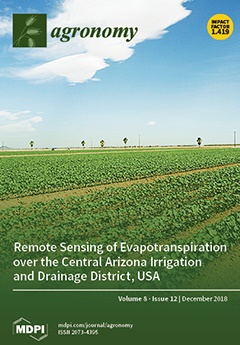Ver ítem
- xmlui.general.dspace_homeCentros Regionales y EEAsCentro Regional Buenos Aires SurEEA BarrowArtículos científicosxmlui.ArtifactBrowser.ItemViewer.trail
- Inicio
- Centros Regionales y EEAs
- Centro Regional Buenos Aires Sur
- EEA Barrow
- Artículos científicos
- Ver ítem
Dynamics of glyphosate resistance in Lolium perenne: pollen-mediated gene flow under field conditions in Argentina
Resumen
The genus Lolium has shown a high tendency to evolve resistance to herbicides. Considering the high level of allogamy of L. perenne and the importance of the wind as an agent for pollen dispersion, the aim of this work was to assess and quantify the effective glyphosate-resistant gene flow by pollen in L. perenne under field conditions. Pollen-mediated gene flow from glyphosate-resistant to -susceptible plants was studied using a donor–receptor design.
[ver mas...]
The genus Lolium has shown a high tendency to evolve resistance to herbicides. Considering the high level of allogamy of L. perenne and the importance of the wind as an agent for pollen dispersion, the aim of this work was to assess and quantify the effective glyphosate-resistant gene flow by pollen in L. perenne under field conditions. Pollen-mediated gene flow from glyphosate-resistant to -susceptible plants was studied using a donor–receptor design. The results indicate that the effective gene flow reached trap plants distanced ≤35 m downwind from the source of pollen. The progeny of receptor plants growing 0 m from the pollen donors showed 13% of individuals with low glyphosate sensitivity. This represents a seven-fold increase in the frequency of glyphosate-resistant individuals found in the progeny of plants isolated during the flowering period (negative control). Similarly, the progenies of plants grown at 15 and 25 m from the source of glyphosate resistance showed an increase in the frequency of resistant plants by about four- and two-fold, respectively. When the receptor plants were located at >35 m, no glyphosate-resistant plants were detected in their progenies. Management should aim for prevention or delay of flowering of glyphosate-resistant plants.
[Cerrar]

Autor
Yanniccari, Marcos Ezequiel;
Istilart, Carolina Maria;
Gimenez, Daniel Oscar;
Castro, Ana Maria;
Fuente
Agronomy 8 (12) : 286 (2018)
Fecha
2018-11
Editorial
MDPI
ISSN
2073-4395
Formato
pdf
Tipo de documento
artículo
Palabras Claves
Derechos de acceso
Abierto
 Excepto donde se diga explicitamente, este item se publica bajo la siguiente descripción: Creative Commons Attribution-NonCommercial-ShareAlike 2.5 Unported (CC BY-NC-SA 2.5)
Excepto donde se diga explicitamente, este item se publica bajo la siguiente descripción: Creative Commons Attribution-NonCommercial-ShareAlike 2.5 Unported (CC BY-NC-SA 2.5)


